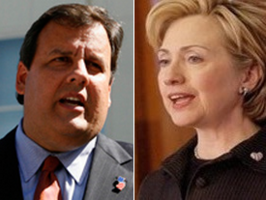48% Less Likely to Vote for Christie In 2016 If Retaliation Charges Are True
Roughly half of voters nationwide say they would be less likely to vote for New Jersey Governor Chris Christie for president if it turns out he retaliated against an elected official who refused to support his reelection.
Forty-eight percent (48%) of Likely U.S. Voters say they would be less likely to vote for Christie in 2016 if it is proven that his office retaliated against an official who refused to support him, according to a new Rasmussen Reports national telephone survey. Thirteen percent (13%) say they would be more likely to vote for Christie if that is the case. Thirty-three percent (33%) say it would have no impact on their voting decision. (To see survey question wording, click here.)
Predictably, most Democrats (53%) say they would be less likely to vote for Christie, but nearly as many Republicans (45%) and voters not affiliated with either major party (46%) feel the same way.
Christie on Thursday apologized for the incident in early September in which lanes onto the George Washington Bridge were closed causing massive traffic jams in retaliation for the mayor of Fort Lee's refusal to support his reelection. The governor said he fired a top staff member who was involved but repeatedly insisted that he was unaware the lane closures were retaliation until he read media reports the day before.
Fifty-four percent (54%) of New Jersey voters think it's likely Christie knew the lane closures were political retaliation, and 56% believe he should resign if it's proven that he knew about the retaliation beforehand.
Forty-nine percent (49%) of likely voters nationally share a favorable opinion of Christie, while 41% view him unfavorably. This includes 15% with a Very Favorable opinion and 14% with a Very Unfavorable one. Three percent (3%) say they've never heard of him.
This compares to 43% with a favorable opinion and 35% with an unfavorable one in April 2012 when he was less well-known nationally and being considered as a possible running mate for GOP presidential nominee Mitt Romney.
Seventy-three percent (73%) of voters nationwide have been following recent news reports about Christie, including 37% who are following Very Closely. That's comparable to the number who are following stories about the National Security Agency's recently disclosed domestic spying programs.
(Want a free daily e-mail update? If it's in the news, it's in our polls). Rasmussen Reports updates are also available on Twitter or Facebook.
The survey of 1,000 Likely Voters was conducted on January 9-10, 2014 by Rasmussen Reports. The margin of sampling error is +/- 3 percentage points with a 95% level of confidence. Field work for all Rasmussen Reports surveys is conducted by Pulse Opinion Research, LLC. See methodology.
While the presidential election is still nearly three years away, media speculation has made Christie one of the top Republican contenders and a challenger to the party's more conservative Tea Party wing. In mid-November, Christie barely edged Kentucky Senator Rand Paul when Republican voters were asked whom they would choose as the party's 2016 presidential nominee.
The New Jersey governor ran even with leading Democratic contender Hillary Clinton at that time.
Twenty percent (20%) of voters think Christie is more ethical than most politicians, while the identical number (20%) feel he is less ethical. Forty-six percent (46%) view him as about as ethical as his political peers. Fourteen percent (14%) are not sure.
Perhaps in part that's because a plurality (48%) believes most elected officials use their offices to help those who support them and punish those who oppose them. Twenty-four percent (24%) don't believe that's true. Twenty-eight percent (28%) are undecided.
Sixty-one percent (61%) of Republicans have a favorable opinion of Christie, compared to 39% of Democrats and 50% of unaffiliated voters. Over 40% of voters in all three groups agree that Christie is about as ethical as most politicians.
Generally speaking, the older the voter, the more likely he or she is to have a favorable opinion of Christie.
While many conservatives in Republican ranks oppose a Christie candidacy, conservative voters nationally view him more favorably than moderates and liberals do.
Voters with a favorable opinion of Christie tend to say the retaliation incident will have no impact on their voting decision in 2016. Two-out-of-three voters who don't like the governor say they would be less likely to vote for him if it's true.
Sixty-four percent (64%) of all voters rate government ethics and corruption as Very Important to their vote in the next election. But voters are evenly divided when asked which political party they trust more to handle these type issues.
Additional information from this survey and a full demographic breakdown is available to Platinum Members only.
Please sign up for the Rasmussen Reports daily e-mail update (it's free) or follow us on Twitter or Facebook. Let us keep you up to date with the latest public opinion news.
The survey of 1,000 Likely Voters was conducted on January 9-10, 2014 by Rasmussen Reports. The margin of sampling error is +/- 3 percentage points with a 95% level of confidence. Field work for all Rasmussen Reports surveys is conducted by Pulse Opinion Research, LLC. See methodology.
Rasmussen Reports is a media company specializing in the collection, publication and distribution of public opinion information.
We conduct public opinion polls on a variety of topics to inform our audience on events in the news and other topics of interest. To ensure editorial control and independence, we pay for the polls ourselves and generate revenue through the sale of subscriptions, sponsorships, and advertising. Nightly polling on politics, business and lifestyle topics provides the content to update the Rasmussen Reports web site many times each day. If it's in the news, it's in our polls. Additionally, the data drives a daily update newsletter and various media outlets across the country.
Some information, including the Rasmussen Reports daily Presidential Tracking Poll and commentaries are available for free to the general public. Subscriptions are available for $4.95 a month or 34.95 a year that provide subscribers with exclusive access to more than 20 stories per week on upcoming elections, consumer confidence, and issues that affect us all. For those who are really into the numbers, Platinum Members can review demographic crosstabs and a full history of our data.
To learn more about our methodology, click here.




